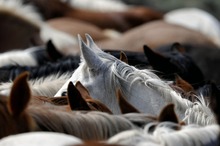As of Friday, October 12, 2012, horse dealers and "killbuyers" arriving with their trucks filled with American horses slated to be slaughtered in Canada for their meat were told to take their horses and go home.

USA horses stopped at Canadian border
Speculation continues to make horse advocates and killbuyers wonder if the surprise ruling banning horses from the USA originated from the Canadian government, the European Union (EU) or the packing plants.
© 2012 by Carien Schippers
According to the Equine Welfare Alliance, New Holland Auction in Pennsylvania, Sugarcreek Auction in Ohio, and Shipshewana Auction in Indiana all confirmed rumors that although the Canadian borders were open, the trucks were turned away as they arrived at the slaughterhouses.
In 2007, the last slaughterhouse in the United States closed when Congress ended the funding of federal inspectors. Since then horses have continued to be exported to Canada and Mexico where they are slaughtered for their meat which is then sent to European markets.
It is unclear whether this ban will be permanent or temporary, but the decision to stop the slaughter of American horses in Canada comes one day after the report by the Commission's Health and Consumers Directorate-General was released which stated the veterinary records of horses are "insufficient" to guarantee health standards relating to the European Union's concerns about United States horses' medication histories.
Speculation continues to make horse advocates and killbuyers wonder if the surprise ruling originated from the Canadian government, the European Union (EU) or the packing plants.
By July 31, 2013 the EU will require lifetime medication records for slaughter bound horses. Thus far the Equine Identification Documents required for all horses bound for slaughter have brought doubt as to their accuracy.
Almost all American horses are routinely treated with the anti-inflammatory phenylbutazone (bute) which is classified as a carcinogen and disqualifies the horse from being slaughtered for human consumption. Horses in the United States are not raised as food animals.
It has not been confirmed whether horse slaughter has been discontinued for American horses in Mexico although most of their trade is with the EU.
According to John Holland, President of Equine Welfare Alliance:
"We all knew this was coming and have warned of it for years, yet the suddenness caught all by complete surprise. The EID (Equine Information Document) was the last chance for the horse slaughter industry and its agents to show they could be trusted to assure the safety of the horse meat that is their stock and trade.
But their long history of flaunting environmental, transport, humane and other regulations made it inevitable that they would treat the drug residue issue as a joke. True to form, they are already blaming "animal rights" radicals."
No one knows if this ban on the slaughter of American horses is temporary or permanent, but thousands of horses are feared to have been caught in the slaughter pipeline - the horses who have been shipped and now are being returned or are at temporary holdover facilities.
Horse rescues have been asked to be on alert in order to help feed, rescue and possibly help find homes for horses that were destined to die on Friday.
Jerry Finch, from Habitat for Horses in Texas will be setting up an escrow fund through an accountant to release donated funds to pay for horses. The Humane Society of the United States and the American Society for the Prevention of Cruelty to Animals are also standing by ready to help as are other horse rescue organizations.
According to Equine Welfare Alliance, the public should be aware there are internet scams popping up everywhere claiming to be rescuing the horses caught in the pipeline.
"We suggest anyone that becomes involved in pulling horses, set up something similar or an escrow account. That way, those donating will know their money is going to a legitimate organization and the money will be used as intended.
EWA will not be accepting any donations for this. We ask that everyone work with the organizations doing the work and check them out before donating."
